What is the key to a happy marriage? Is there a formula for long-term love? And how do you keep the passion alive after more than 50 years together? Six happily married couples share their secrets, from never eating in front of the television to keeping some things a mystery
Together for 56 years
Gem, 74, and Ezra Harris, 74, grew up in Glengoffe, a village in St Catherine, Jamaica. Ezra emigrated to England at 19, Gem followed him two months later, and they married in August 1958. They settled in Bradford. Ezra was a forklift driver and Gem worked in domestic service until they both retired. They have three children, Jennifer, 55, Christopher, 52 and Samantha, 45, and four grandchildren.
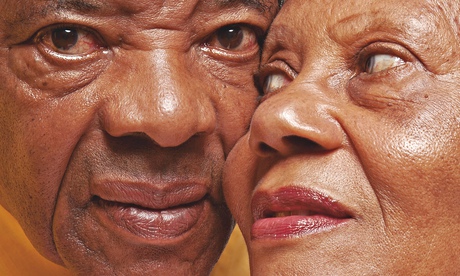 Ezra and Gem Harris: ‘ We have a good time. We used to love a dance, listen to reggae, calypso. But it’s hard now with our bad knees.’ Photograph: Bohdan Cap for the Guardian
Ezra and Gem Harris: ‘ We have a good time. We used to love a dance, listen to reggae, calypso. But it’s hard now with our bad knees.’ Photograph: Bohdan Cap for the Guardian
Ezra: Back home, people used to talk about abroad as if the whole place was paved with gold. When a plane passed overhead we would all look up and wish we were on it. One day I heard an advertisement on the radio, saying you could come to Britain and get work. It was a promise of a future. I wanted to make myself better off and be somebody.
I arrived in Bradford in June. It was supposed to be summer but I can remember the cold, the smell of the coal. The first day I was here, I felt like going back. You feel lonely; you miss your parents. I thought it would be much easier if I got a wife.
Gem had been two years below me in church school. I didn't know anything about women. My father was a preacher and very strict. I wrote to her saying I'd like to send for her to come and marry me. I hoped she'd agree and she did – she was glad to come because I bought her a ticket out of Jamaica. I knew she would make a good wife.
We didn't go back to Jamaica until 1973. Everything seemed different – smaller, farther away. It didn't feel like home. But still, after all this time, I can't get shot of my accent. Gem always tells me, "Speak English!" But you cannot teach an old dog new tricks.
Fifty-six years we have been married. You must work at it. Talk to each other. Disagree, but don't let arguments drag on. Don't go around having lots of kids with women and not looking after them. And believe in God. If you trust in Him, everything is going to be all right.
I try to be a good husband. I try not to come in with mucky hands. She worries about me passing first, and I tell her, "Don't worry about a thing." But if she goes first I will be miserable.
We're going to go on a cruise, and when I booked it the lady asked if we would like separate beds. I said, "What are you talking about, woman?" We are husband and wife. Sometimes you still get some fun!
Gem: I remember looking down from the plane as I flew into England for the first time, and seeing all this smoke coming from the chimneys. It looked as if the whole place was on fire.
Even now, I don't know how I managed to get to Bradford alone. Ezra didn't come to meet me at the station – I am still angry with him about that – so I got a taxi to his lodgings. It was just a room, really, with a coal fire and a paraffin heater.
I'd brought a wedding dress from home, and my mother's veil. I arrived on 12 August, and we married on 30 August in a register office. I missed my family very much at first, but you get used to it. The winters were hardest.
There was a lot of racism back then. People would shout, "Go back to your dirty country!" They treated you as though you were nothing. It was hurtful, but you just try to keep away from trouble.
Ezra calls me "the wife", which he shouldn't do. I'll tidy up the house and he'll go and leave crumbs. We quarrel every day, but we always make up.
He likes to cuddle, but I don't bother. I am always telling him to talk properly, but when I get mad, I talk in patois: "Shuttup and come dung ere, man!" He just laughs.
We have a good time. We used to love a drink and a dance at the African-Caribbean centre, listen to some reggae, some calypso – but it is upstairs and it's hard to get up there now with our bad knees. On Sundays I'll always cook Jamaican food for the family – curried goat, rice and peas, but always with yorkshire pudding, too.
Together for 52 years
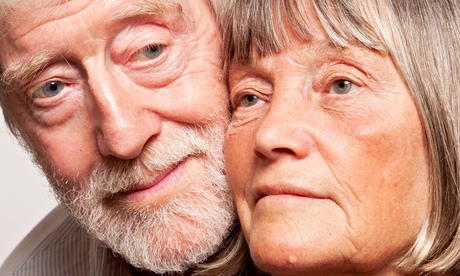 Mick and Barbara Wilson: ‘ I know many couples can’t survive such loss, but we could always talk and cry together.’ Photograph: Bohdan Cap for the Guardian
Mick and Barbara Wilson: ‘ I know many couples can’t survive such loss, but we could always talk and cry together.’ Photograph: Bohdan Cap for the Guardian
Barbara, 72, and Mick Wilson, 79, met in 1960 and married in 1962. Their eldest daughter, Sarah, died in a white-water rafting accident 14 years ago in Peru, when she was 36. Barbara is a neuropsychologist; Mick is a retired English teacher, and they live in Bury St Edmunds. They have two surviving children, Anna and Matthew, and four grandchildren.
Barbara: I was in my first year at teacher-training college when Mick, in the year above, invited me to his room for coffee. "Mick Wilson never invites people for coffee," a friend told me. He gave me a large German beer mug full of Nescafé; I think he wanted to make a good impression.
Mick thought we should wait to have children, but I decided we shouldn't. We were hippies: no TV, no car, we made our own bread. Mick had long hair and a beard and wore bell-bottoms. We had lots of cats and stick insects. I was a housewife, but Mick wanted me educated. I took my psychology A-level when I was 29, then a degree, a master's, and a PhD.
In 2000, I was leaving work when a colleague said, "Mick's on his way over." I just knew something awful had happened. Maybe it's the cat, I thought. Please let it be the cat. Mick called from the motorway. "There's terrible news." Some part of me already knew. "Is it Sarah? Is she dead?" He said, "I think so."
We somehow got through that night. Some kind of madness takes over. It's anguish, grief and everything in between. We took turns to be strong, I think. We talked and cried and held each other. We arranged to go out to Peru the following week and Mick paid £10,000 for a helicopter to look for Sarah's body. It was pointless, of course, but I knew he needed to do it, so I let him. Sarah has never been a taboo: we talk about her every day.
Mick: It was always a strong marriage. We've done daft things, of course. Back in the old, hippy days we thought we wanted an open marriage, but we tried it once or twice and it didn't work out for us. It taught us both that the best kind of arousal comes through affection, not sex with just anyone.
Our daughter Sarah's marriage had broken down after years of failed fertility treatments and she went to Peru to rethink her life. To this day, we've never had a body to bury. We won't ever have closure. You can learn to live with it, but you'll never close the book. I know many couples find their relationship can't survive this kind of loss, but ours did because we could always talk to each other and cry together.
We are in our old age now and, the way we see it, we've lived a happy life, apart from one terrible tragedy. We have two wonderful children, and four grandchildren. To have the marriage we have, the life we have together, I think we've been very privileged.
Together for 36 years
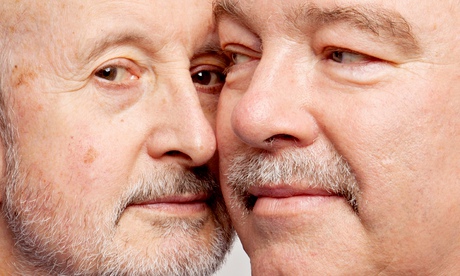 Howard Shepherdson (left) and Rod Marten: ‘ We have no separate lives. We spend every day together and it never gets boring.’ Photograph: Bohdan Cap for the Guardian
Howard Shepherdson (left) and Rod Marten: ‘ We have no separate lives. We spend every day together and it never gets boring.’ Photograph: Bohdan Cap for the Guardian
Rod Marten, 71, and Howard Shepherdson, 60, met in a pub in London in 1978. Rod is a retired tax inspector; Howard is a semi-retired management consultant. They were the UK's first same-sex couple to be legal long-term foster parents; their son, Glen, is 43. Rod and Howard have two grandchildren, and have been civil partners since 2005. They live in Ealing, west London.
Howard: I had always thought the idea of love at first sight was a cliche. But one Thursday night in 1978, that's what happened. I spotted Rod at the bar and it was just lovely from the moment we started chatting. I went home to my parents in Sussex that weekend feeling quite delirious. I thought, "What is this?" It was like catching pneumonia.
In 1985 I was a school counsellor and had been working with a 14-year-old boy, Glen, from a children's home. One day, Glen just asked me: "Will you be my dad?" I thought it was best to be honest with him, so I said I was afraid it was impossible, because I'm gay. Glen said, "Why should that matter?" And it struck a chord. Rod and I decided we might as well try. No gay couple had formally adopted – or long-term fostered, as we did – before. It was very strengthening, loving someone together and them loving you back. He now lives in France with his wife, Isabelle. We visit all the time, and Skype. Having grandchildren has been a deeply enriching experience for us.
Rod and I are not at all independent of each other. We have no separate lives. We spend every day together and it never gets boring. Yes, sex does start to slow down at our age, but physical intimacy shouldn't. We still curl up on the sofa together, as we have done for ever. There's just one thing we avoid completely as it would mean instant divorce – DIY.
Rod: When I went into work the day after I'd met Howard, a colleague said I seemed different, extra-happy. I was. We met in September and by December we were looking to buy a flat together. I think my family thought it was a bit soon, but we're still in the same flat, 36 years later.
In the 80s, being openly gay on the street was not something you felt particularly secure doing. We've never walked around holding hands. If we were 21 now we'd do it, but you can't just start doing that in your 60s. Getting our civil partnership was a political statement, but as the date got closer, it felt very romantic.
I think relationships need rules. Work must never dominate your life. We never go to sleep on an argument. I am a terrible procrastinator, and Howard is an over-organiser, but you have to learn to love the other person for who they are, and not be frustrated by what you want them to be. It's no good being perpetually disappointed. Our other absolute rule is that we never, ever eat dinner in front of the television. We haven't done it once in 36 years.
Together for 40 years
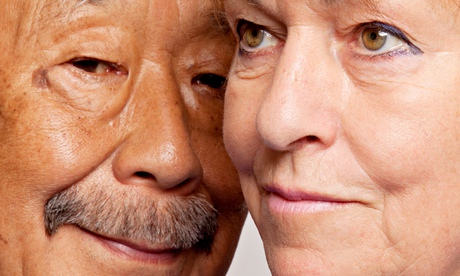 Setsuo Kato and Jill Fanshawe Kato: ' We’ve both had admirers over the years, but we have got strong self-discipline.’ Photograph: Bohdan Cap for the Guardian
Setsuo Kato and Jill Fanshawe Kato: ' We’ve both had admirers over the years, but we have got strong self-discipline.’ Photograph: Bohdan Cap for the Guardian
Jill Fanshawe Kato, 68, and Setsuo Kato, 72, met in London in the early 70s and married in Tokyo in 1974. They spent two years living in Japan before moving back to the UK and settling in north London. Setsuo is a freelance photojournalist; Jill is a potter.
Jill: I had visited Japan in my 20s and found it a very chauvinistic place. But I'd got quite far with my Japanese and wanted to carry on learning, so I joined an evening class in Holborn. Setsuo turned up one night to interview students for an article that he was writing.
Luckily for us, our families were very supportive. We had a traditional Japanese wedding in Tokyo. I wore a pink kimono with kanzashi hair ornaments.
I think after all these years together, I have started looking a bit Japanese. I've always used kohl round my eyes, and I like to wear Japanese textiles. I suppose it's attitude and behaviour, too. I'm from Devon, but British people can never tell where I'm from.
We never had children – perhaps that is the thing that has kept us together, and given us greater independence. We've both had admirers over the years, but we have got strong self-discipline. You need to be kind to each other, remember the value of what you have.
There should always be an unknown area of your partner. There is a lot of mystery about Setsuo. We would never go to the loo in front of each other; there is privacy and respect between us. We've lived in this house for more than 30 years, but Setsuo has never once gone into my studio at the top of the house. We are probably still finding things out about each other, even now.
Setsuo: Japanese men who travelled to London in those days were not mainstream – we were adventurous types. It wasn't as if you just hopped on a plane. I'd caught a Russian boat from Yokohama, and took the Siberian railway all the way to London.
I have lived here a long time, but I always consider myself Japanese. I am not very good at being physically affectionate. I am a bit better at it than most Japanese men, but I don't talk about my feelings. I don't lose my temper.
Jill and I give each other huge freedom. Jill will often go abroad for a month or two to work, and I enjoy a social life more than her – I zoom off and come back as I wish. We've always said we face the world back to back.
I think you have to be patient. When life is down, people think changing partners will help – but I'm not convinced anyone is better off in the long run. It would just be awful to have to start again.
We are like two trees that have grown together; our roots are entwined.
Together for 59 years
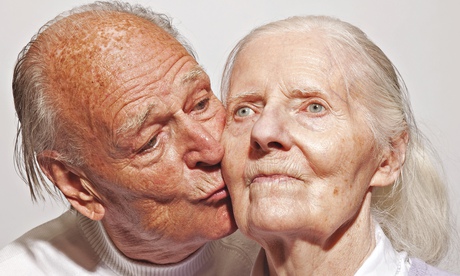 Patrick and Doreen Skilling: ‘ We married at the Savoy, way above our station.' Photograph: Bohdan Cap for the Guardian
Patrick and Doreen Skilling: ‘ We married at the Savoy, way above our station.' Photograph: Bohdan Cap for the Guardian
Doreen, 89, and Patrick Skilling, 86, married in 1955. They lived in Notting Hill for 50 years; Patrick was an advertising executive and Doreen designed wallpaper for Biba. In the 70s, the couple gave up their jobs to run a furniture stall together in Portobello Market. Doreen was diagnosed with Alzheimer's in 2006 and they now live together at the Sunrise care home in Beaconsfield.
Patrick: A colleague had been trying to take Doreen out. He said to me, "Take this bird out, will you? I can't handle her." So I took her for a drink. I was wildly impressed. We dated for five years and were married in the Queen's Chapel at the Savoy. It was way above our station, but Doreen somehow managed it.
We always thought we would have children, but by the time we realised it probably wasn't going to happen, it was too late. We weren't sad about it at the time – it wasn't something we even talked about – but now I think it may have been the greatest tragedy of our lives. When I see Doreen cuddling a doll now, I wonder whether it may have affected her more than she let on, that there might be a deeper sense of loss.
I was earning good money in advertising, smoking and drinking too much. I'm sorry to say I failed her many times; falling into the pitfalls that husbands do. But Doreen was always very patient. We decided I'd leave my job and we'd become business partners. So we took a stall in Portobello Market, and started selling antiques and junk furniture. It revitalised our married life. We had time to talk.
Ten years ago, I started to notice Doreen was having problems with numbers. She couldn't sort out the change. It was two years before we got a diagnosis, that she had Alzheimer's. She has never really understood what is happening to her. The change in her was slow and almost imperceptible. But I wept for her. It was so dreadful that such a lovely person should face such a thing.
All along I'd assumed we'd stay at home. But after six years, she developed problems I just couldn't cope with. She moved into a home, and for two months I visited her every day. It was obvious from day one that I should live there, too. I wanted to continue being important in her life. Selling our house was like losing another partner. You mourn for these things, as if they were human; the conservatory full of plants we'd tended together, all her paintings.
Doreen lives on a secure wing, and I have a separate room. She doesn't communicate at all now. She sits around looking lovely. I envy her tranquillity. I go up every day. She doesn't know it's me – Pat, her husband – but I think she thinks I'm a friendly face. That's good enough for me. I just cherish what's left.
Now I must fill my days. I walk, garden, do my stamp albums. I don't want to sit slumped on a chair, like everyone else here. And Doreen, she'll just fade away. She won't be afraid of it. But I'll be shattered. Inertia will probably keep me here after she's gone. I am 86, and it's just too daunting to find a new house. But you live day by day. It's hard to live any other way.
Together for 73 years
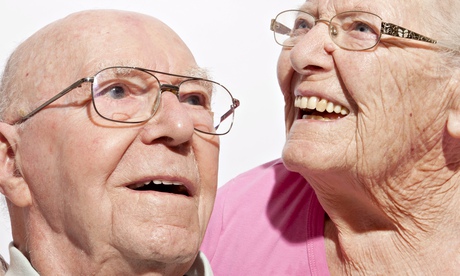 Fred and Gladys Croft: ‘ It will come some day, life without each other. We don’t like to think about it’ Photograph: Bohdan Cap for the Guardian
Fred and Gladys Croft: ‘ It will come some day, life without each other. We don’t like to think about it’ Photograph: Bohdan Cap for the Guardian
Gladys, 100, and Fred Croft, 96, met at a dance in New Malden, south-west London, in 1931. Gladys was a factory worker; Fred an engineer who then joined the air force. They married in 1940, before Fred was posted abroad. After the war, Fred worked for the NHS, and the couple settled in the London suburbs. They have a daughter, Audrey, 69, and a grandson, Iain, 41. They live in couples' accommodation in the Acacia Mews care home in St Albans.
Gladys: My mother died of an asthma attack when I was 18, and my father remarried and went off with his new family. He paid our rent, but we never saw him again. My youngest sister was only eight, so we had to bring ourselves up – five sisters in a small flat in Raynes Park.
I would go out with the girls I worked with at the weekend. We'd always have a good laugh. That's where I saw Fred for the first time, at a dance. I loved dancing back then.
We got married just before he left for the war and I wore a wedding dress that three of my sisters had already worn. We didn't have many guests, just my sisters and Fred's mum, who had made a fruitcake.
I didn't want children during the war, because so many fathers didn't come back, you see. You can't think the worst, but my sister's husband was killed in the war – terribly sad.
Audrey was born in May 1946. It was too late to have any more children, because I was so old – 32. We decided that we wouldn't have any more.
We've had some wonderful holidays. Fred would often surprise me by booking a hotel for the weekend. We both love seeing places – Denmark, Spain, Ireland – but we'd never take a package tour. We liked to do it ourselves, see a lot of things.
We don't get flustered; I think that's the secret. Fred is very easy-going. He'll go into the garden and I'll leave him be. He has been a good husband, and I think I've been a good wife.
We haven't had difficult times or problems like many other people have – we've had good health, nice holidays, and we've worked hard. We've done everything together, and always had each other. We've never been lonely. I have never been unhappy in all my life. You have to make your own pleasures, don't you?
Fred: There's nothing magical about it, really. We've just lived a normal life. If you've got problems, you sort them out. We have arguments, but we've never had a row. Not a proper one.
Yes, there are things we would have liked to have, but if we couldn't afford it, we didn't buy it. We never bought a house. Borrowing money makes for trouble. I've met two people in my life with plenty of money and they've never been happy. Money causes terrible worries for people.
The things you saw in the war, they shaped you. These days, youngsters don't seem satisfied with life. They think nothing of getting married three times. Our grandson, Iain, is divorced. I think you've got to try to be happy with what you have. Don't always be looking elsewhere. Don't aim for the moon.
I've always let Gladys do what she pleased. If she wanted to go out with the girls, she just went. I didn't worry. But I've always included her in my interests, that's the thing. I love boats, and we had wonderful barge holidays together for 30 years.
It'll come some day, life without each other. We don't like to think about it. Gladys gets panic attacks. I can't stand up on my own any more, so I can't help her. It's terrible to watch. I wouldn't want to be without her.
No comments:
Post a Comment